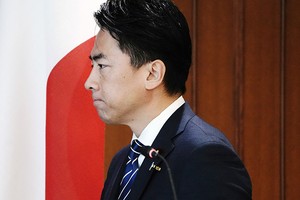July 6, 2021 at 13:03 JST
 Prime Minister Yoshihide Suga meets reporters at the prime minister's office on July 5 after his Liberal Democratic Party and its junior coalition partner, Komeito, failed to win a combined majority in the Tokyo metropolitan assembly election on July 4. (The Asahi Shimbun)
Prime Minister Yoshihide Suga meets reporters at the prime minister's office on July 5 after his Liberal Democratic Party and its junior coalition partner, Komeito, failed to win a combined majority in the Tokyo metropolitan assembly election on July 4. (The Asahi Shimbun)
In the Tokyo metropolitan assembly election on July 4, the ruling Liberal Democratic Party, which suffered a historic drubbing in the previous poll in the capital, managed to regain its status as the largest bloc in the assembly.
But the LDP failed to achieve its goal of securing a majority with its junior coalition partner, Komeito.
The election outcome should be viewed as a harsh voter verdict on Prime Minister Yoshihide Suga’s leadership in tackling such key policy challenges as the new coronavirus pandemic and the Tokyo Olympics. Japan is in the grip of another wave of COVID-19 cases less than one month before the start of the Summer Games.
The LDP saw an opportunity to bounce back due to the declining popularity of Tomin First no Kai (Tokyoites First), a regional party that quickly grew to a significant political force in the capital four years ago thanks to wholehearted support from Tokyo Governor Yuriko Koike.
But the ruling party’s scenario did not come to pass. The 33 seats of the 127-member assembly it won was less than the 38 it captured in 2009, when Finance Minister Taro Aso was the prime minister, just before the party was unseated from power in the Lower House election on Aug. 30 that year.
The LDP’s weak performance in the assembly election should be characterized as an effective defeat.
Suga on July 5 said he “humbly” accepts the election outcome. But he needs to realize the grim fact that he cannot win back the trust of voters by uttering a few seemingly humble words.
Many ruling party lawmakers believe the confusion surrounding the government’s vaccination program generated political “headwinds” for the party.
Under Suga’s initiative to accelerate the campaign to inoculate the nation against COVID-19, the government called for a wide range of companies to arrange for allowing shots to be administered at workplaces, but that plan has been suspended due to a shortage of vaccines.
It is hardly surprising that many people became bewildered and frustrated as the suspension came after they worked hard to prepare for workplace vaccinations. The government needs to make a critical evaluation on its performance in working out and explaining the plan.
The Suga administration’s single-minded drive to proceed with the Olympics and Paralympics was also sharply divorced from the general perceptions about the events among voters in Tokyo.
In an Asahi Shimbun poll of voters in Tokyo conducted during the official campaign period for the assembly election, 60 percent of the respondents said the Olympics and Paralympics should be either canceled or postponed again. Over 60 percent of those polled said in the event the Games are held, no spectators should be allowed.
There is no doubt that the capital’s voting public does not place much confidence in Suga’s repeated vow to ensure a “safe and secure Olympics.”
The Tomin First party won a sufficient number of seats to earn it the status as the second largest bloc following the LDP by campaigning on a promise to ensure the Olympic events will be held without spectators.
The Japanese Communist Party, which made a strong call for canceling the Games, boosted its strength in the assembly. The administration should take these facts seriously.
Suga delivered an address in front of the LDP’s headquarters on the day campaigning officially kicked off but never gave a campaign speech on the streets.
Suga cited his desire to avoid generating crowds during the pandemic as an explanation for his low-profile role in the campaign. That is not totally unconvincing, but he nevertheless came across as being less than eager to take the opportunity to promote his policies to the public.
Tokyo metropolitan assembly elections, large-scale polls in an area with a huge number of voters with a high ratio of independents, are often seen as a precursor to a following national election.
That is why all political parties poured a lot of energy into their campaigns for the poll as a prelude to the upcoming Lower House election, set to be held by autumn.
The Constitutional Democratic Party of Japan, the largest opposition party in the Diet, doubled the number of its seats, but only from a weak base of a single figure. The party failed to demonstrate its power to attract voters, being eclipsed by the Tomin First group as a potential alternative to the ruling coalition for voters critical of the LDP-led government.
The CDP and the JCP managed to strike deals not to field separate candidates in some single- and two-seat districts to avoid splitting votes for the opposition camp between them, achieving a certain degree of success.
The two parties should examine how these arrangements worked in each of the districts to learn strategic lessons for the Lower House poll.
--The Asahi Shimbun, July 6




















A peek through the music industry’s curtain at the producers who harnessed social media to help their idols go global.
A series based on diplomatic documents declassified by Japan’s Foreign Ministry
Here is a collection of first-hand accounts by “hibakusha” atomic bomb survivors.
Cooking experts, chefs and others involved in the field of food introduce their special recipes intertwined with their paths in life.
A series about Japanese-Americans and their memories of World War II